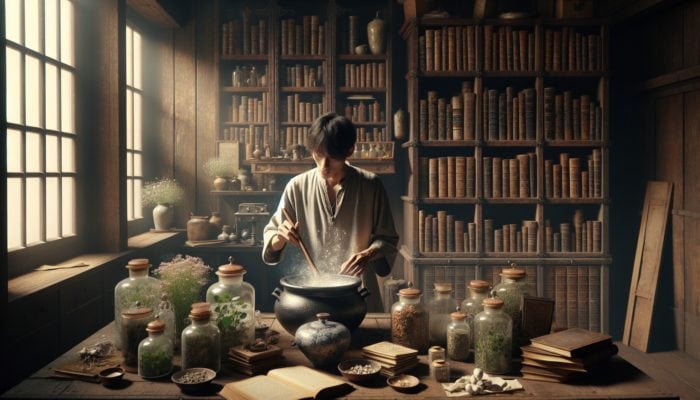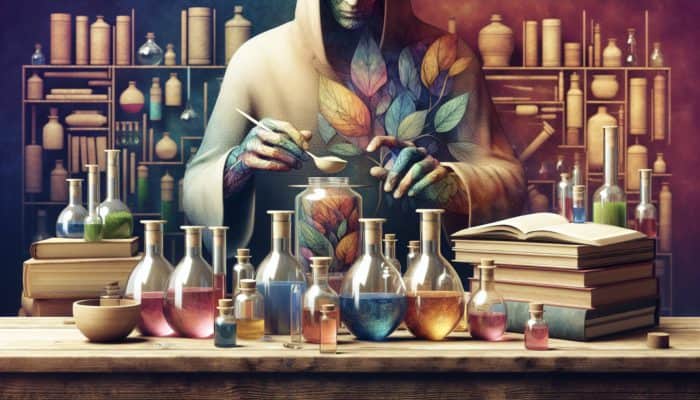Discover How to Create Powerful Herbal Elixirs with Beneficial Herbs from the UK
Key UK Herbs to Incorporate into Your Homemade Herbal Elixirs

Embarking on the fascinating journey of crafting herbal elixirs at home requires a thoughtful selection of herbs that are both plentiful and beneficial in the UK. Essential herbs you should consider include nettles, Dandelions, and elderflowers. Commonly found in hedgerows and woodlands, nettles are highly valued for their impressive nutrient profile, which includes essential vitamins A and C, along with vital minerals such as iron and calcium. Dandelions, often overlooked as mere weeds, are rich in antioxidants that significantly aid in liver health and improve digestion. The fragrant elderflowers not only delight the senses but also possess powerful anti-inflammatory and immune-boosting properties.
These herbs thrive in a variety of ecosystems across the UK, enabling enthusiastic foragers and herbalists to easily access them. Their seasonal availability allows for a vibrant selection of elixirs tailored to meet diverse health needs and personal tastes. By gaining a comprehensive understanding of the benefits associated with these herbs, you can effectively harness their properties in your herbal creations, enhancing both flavour and health benefits in your concoctions.
Best Places to Source Quality Herbs for Your Herbal Elixirs in the UK
Foraging for herbs can be an incredibly fulfilling experience, providing an opportunity to connect with nature while gathering essential ingredients for your elixirs. However, for those who may not have the time or expertise for foraging, purchasing high-quality herbs serves as a practical alternative. Here are some effective strategies to source herbs in the UK:
- Explore local farmers' markets, where you can find fresh, organic produce bursting with flavour and nutrients.
- Visit specialty health food shops that usually offer a wide variety of dried herbs and herbal products.
- Utilise online herbal retailers like Herbal Haven and Herbology for an extensive range of herbal options.
- Engage with community gardens or allotments, which may provide opportunities to trade or acquire herbs.
- Join foraging groups or attend workshops dedicated to teaching sustainable harvesting practices.
- Investigate botanical gardens, which might host foraging events or directly sell herbs to the public.
Choosing the right source for your herbs can significantly affect the quality and potency of your elixirs. It is crucial to be mindful of sustainable sourcing practices to ensure that you obtain your herbs ethically, ultimately impacting the effectiveness of your herbal mixtures.
Proven Methods for Storing Your Herbs to Maintain Freshness
After gathering your herbs, the next critical step is to store them properly to preserve their potency and therapeutic benefits. Implementing effective storage techniques is essential, as herbs can lose their efficacy over time if not handled with care. One reliable method for preserving herbs is drying. You can achieve this by hanging them upside down in a cool, dry area away from direct sunlight. Alternatively, a dehydrator or an oven set to a low temperature can expedite the drying process, ensuring your herbs retain their quality.
Another effective method for preserving herbs, especially those intended for fresh use, is freezing. Simply chop the herbs and place them in ice cube trays, filling them with water or olive oil before freezing. This technique allows you to incorporate small portions of your herbs into elixirs without wasting any precious ingredients. Storing your herbs in airtight containers, shielded from light and moisture, is crucial for retaining their flavours and medicinal properties, ensuring you can create high-quality elixirs whenever you desire.
Become Proficient in Crafting Herbal Elixirs at Home

Choosing the Perfect Herbs for Your Herbal Elixir
Selecting the right herbs for your elixirs necessitates a deep understanding of their properties and the specific health benefits they offer. For instance, herbalists in the UK often choose nettle leaves when crafting elixirs aimed at enhancing vitality and energy due to their rich nutrient profile. Similarly, elderflowers are highly sought after for their ability to support respiratory health, making them a popular choice during the colder months.
It is equally important to consider the seasonal availability of herbs. For example, in spring, fresh dandelion leaves become available, perfect for liver detoxification, while summer brings an abundance of blossoms such as chamomile and lavender that can aid in relaxation and sleep. Practical combinations, like blending dandelion roots with nettle leaves, can yield a robust elixir specifically designed to promote digestive health, showcasing the expertise of UK herbalists in crafting effective botanical blends.
Mastering Infusion Techniques for Enhanced Potency
To successfully extract the medicinal properties of herbs, mastering infusion techniques is vital. Begin by selecting high-quality, dried herbs to guarantee optimal results. The infusion process entails steeping the chosen herbs in a solvent, typically water or alcohol, to extract their beneficial compounds. For water infusions, aim for a ratio of approximately one part herb to ten parts water. Bring the water to a gentle simmer before introducing your herbs, allowing them to steep for a minimum of 20 to 30 minutes.
When using alcohol as a solvent, particularly for more potent elixirs, consider a higher ratio, such as one part herb to five parts alcohol. This method is particularly effective for herbs like elderberries, as it efficiently extracts their flavonoids. After infusion, strain the mixture through a fine mesh or cheesecloth to yield a clear liquid. Remember to store your elixirs in dark glass bottles to shield them from light degradation, ensuring maximum stability of their medicinal properties.
Key Safety and Dosage Considerations for Herbal Elixirs

Understanding safety and dosage is paramount when creating herbal elixirs, especially in the UK, where specific regulations apply. Start with small doses of your elixirs, particularly if you are new to herbalism or trying a new herb. A good starting point could be one teaspoon of your infusion, taken once daily, gradually increasing as you monitor your body's response.
It is essential to consult reliable resources regarding the safety profiles of your selected herbs, particularly if you have pre-existing health conditions or are taking medication. Some herbs may interact negatively with pharmaceuticals, and being aware of these interactions can prevent complications. For instance, herbs like St. John’s Wort are known to interact with antidepressants and contraceptives, necessitating caution. Always prioritise adherence to established guidelines for herbal consumption to ensure that you create elixirs that are both safe and effective.
Best Practices for Storing and Preserving Your Herbal Elixirs for Maximum Freshness
Properly storing your herbal elixirs not only extends their shelf life but also preserves their therapeutic benefits. After preparing your elixirs, transfer them into amber or cobalt glass bottles to shield them from light exposure, which can degrade their quality. It is advisable to store these bottles in a cool, dark place, ideally in a cupboard or pantry, away from any heat sources.
Label each bottle clearly with the name of the elixir and the date it was prepared, as most homemade herbal elixirs can last from several weeks to a few months, depending on their ingredients and storage conditions. If you notice any changes in colour, smell, or clarity, it is best to exercise caution and discard the elixir. By following these storage practices, you will ensure your creations remain effective, allowing you to enjoy their full benefits whenever necessary.
Step-by-Step Process for Preparing Herbal Elixirs at Home
Essential Equipment Needed for Crafting Herbal Elixirs
Creating herbal elixirs in the comfort of your home requires basic kitchen equipment that enhances the entire process. Essential tools include a sturdy pot for boiling water, a fine strainer or cheesecloth for filtering your infusions, and dark glass bottles for proper storage. Additional useful items consist of measuring spoons for accuracy and a funnel to facilitate easy bottling. These tools collectively streamline the preparation and storage of your herbal concoctions, ensuring ease of use while maximising effectiveness.
- A sturdy pot for boiling water or infusions.
- A fine mesh strainer or cheesecloth for filtering.
- Dark glass bottles for preserving the quality of the elixirs.
- Measuring spoons for precise quantities.
- A funnel for easy bottling.
- Labels for marking bottles with contents and preparation dates.
Equipping yourself with the right tools not only simplifies your creation process but also enhances the overall quality of your herbal elixirs, ensuring that each ingredient is correctly prepared and stored for optimal efficacy.
A Detailed Step-by-Step Guide to Preparing Your Herbal Elixir
Preparing a herbal elixir at home can be a straightforward and rewarding process when you adhere to a systematic approach. Start by choosing your desired herbs based on their health benefits and seasonal availability. For instance, select nettle for energy enhancement or elderflower for respiratory support. Next, measure your herbs—approximately one ounce of dried herbs for every 10 ounces of your chosen solvent, whether it be water or alcohol.
Bring your solvent to a gentle simmer, then incorporate the herbs, stirring gently to combine. Allow the mixture to steep for at least 20-30 minutes, with water infusions typically requiring longer steeping times to achieve maximum extraction. Once the infusion is complete, strain the mixture through your fine mesh or cheesecloth to remove solid particles, ensuring a smooth elixir. Finally, pour the elixir into your prepared dark glass bottles, label them with the date and contents, and store them in a cool, dark place to maintain their potency.
Avoiding Common Mistakes When Creating Herbal Elixirs
While crafting herbal elixirs can be a fulfilling experience, there are common pitfalls that can negatively impact the quality and safety of your creations. One prevalent mistake is using herbs that are not properly identified, which can lead to the inclusion of toxic plants. Always ensure you are well-informed about the herbs you are using. Another common error is neglecting the importance of adequate storage; failing to use dark glass containers or exposing elixirs to heat and light can significantly diminish their effectiveness.
Additionally, over-steeping herbs can result in bitter flavours or even unwanted side effects; timing is crucial in the infusion process. Lastly, be cautious with dosages; starting with too high a dose can elicit adverse reactions. By avoiding these missteps, you can enhance the quality and safety of your herbal elixirs, leading to a more enjoyable and beneficial experience.
Selecting the Most Suitable Herbs for Your Elixir
Choosing herbs that complement one another is vital for creating effective elixirs. Begin by identifying the specific health benefits you aim to target. For instance, if you're focusing on digestive health, combining peppermint and ginger can offer powerful synergy. Conversely, if your goal is relaxation, herbs like chamomile and valerian root create a soothing blend. Understanding the properties of each herb allows for harmonious combinations that enhance the efficacy of your elixirs.
Additionally, consider the compatibility of flavours; some herbs may clash, resulting in undesirable tastes. Conducting small taste tests can help you determine which combinations work best for your palate. You can also experiment with ratios, adjusting the proportion of each herb until you achieve a balanced flavour profile that is both enjoyable and therapeutically beneficial.
Effective Storage and Preservation Techniques for Your Herbal Elixirs
Proper storage of your herbal elixirs is critical for maintaining their potency and flavour. After bottling, store your herbal elixirs in a cool, dark place, ideally in a temperature-controlled environment. Use dark glass bottles to protect against light exposure, which can degrade the active components of the herbs.
Label each bottle clearly with the preparation date and contents to keep track of their freshness. Herbal elixirs typically have a shelf life ranging from a few weeks to several months, depending on the herbs used and the storage conditions. If you observe any changes in appearance or smell, it is advisable to discard the elixir. By following these storage practices, you can enjoy the benefits of your herbal elixirs for an extended period, ensuring that your home creations remain effective and delightful.
Exploring the Comprehensive Benefits of Herbal Elixirs
Revealing the Health Benefits of UK Herbal Elixirs
Herbal elixirs offer a myriad of health benefits, particularly when crafted using herbs native to the UK. For instance, nettles are renowned for their anti-inflammatory properties, aiding in alleviating joint pain and enhancing overall immune function. Dandelions are held in high regard for their detoxifying effects, promoting liver health and aiding digestion. At the same time, elderflowers are often employed to alleviate symptoms of colds and flu due to their antiviral properties.
Moreover, herbal elixirs can enhance overall wellness by providing essential nutrients and antioxidants that support various bodily functions. Regular consumption of these elixirs can lead to improved digestion, better skin health, and increased energy levels. Understanding the specific benefits of each herb allows you to tailor your elixirs to effectively meet your health needs, making them a valuable addition to your daily routine.
The Role of Herbal Elixirs in Supporting Mental Well-being
The impact of herbal elixirs on mental health is gaining recognition, with many herbs known for their anxiolytic and mood-enhancing properties. For example, chamomile is widely used for its calming effects, helping to alleviate anxiety and promote restful sleep. Similarly, lemon balm is recognised for its ability to elevate mood and cognitive function, making it an excellent choice for those coping with stress.
Incorporating these elixirs into your daily routine can provide a natural method to support mental well-being. Whether consumed in the morning to energise or in the evening to unwind, herbal elixirs can significantly contribute to enhancing your overall mental health. By carefully selecting herbs known for their positive effects on mood and stress, you can create elixirs that not only taste delightful but also promote a better quality of life.
Can Herbal Elixirs Replace Traditional Medicine?
While herbal elixirs offer numerous health benefits, they should not be viewed as complete substitutes for traditional medicine. Instead, they can function as complementary therapies that enhance overall wellness. For instance, individuals experiencing minor ailments, such as digestive discomfort or seasonal colds, may find relief through herbal elixirs without necessitating pharmaceutical interventions.
However, it is crucial to consult with healthcare professionals when considering elixirs as an alternative to prescribed treatments, particularly for chronic conditions or serious health concerns. The UK’s healthcare system supports an integrative approach, allowing individuals to explore herbal remedies alongside conventional medicine. Understanding the role of herbal elixirs in health management is essential, ensuring they are used safely and effectively.
Proven Strategies for Crafting Herbal Elixirs at Home
Creating Seasonal Elixir Recipes for Optimal Health
Crafting seasonal herbal elixirs enables you to utilise the freshest ingredients available while capitalising on the unique properties that seasonal herbs offer. In spring, consider creating a detoxifying elixir using freshly foraged nettles and dandelion greens, both of which are abundant during this time. This combination can enhance energy levels and support liver function.
During summer, elderflowers reach their peak, making them ideal for crafting a refreshing elixir that promotes hydration and respiratory health. Steep the flowers in water or alcohol, adding a touch of honey for sweetness. Autumn presents the opportunity to use warming spices like ginger and cinnamon combined with apples to create a comforting elixir that bolsters immunity as the weather cools.
In winter, roots like horseradish and garlic can be infused into a robust elixir designed to ward off colds and flu. By aligning your elixirs with the seasons, you not only enhance their flavours but also maximise their health benefits, making this an enjoyable and health-conscious practice.
Customising Elixirs to Address Specific Health Needs
Customising herbal elixirs allows you to tailor them effectively to address specific health concerns or personal preferences. Begin by identifying the specific health issues you wish to target, such as stress, digestive issues, or immune system concerns. For stress relief, consider incorporating herbs like lemon balm, passionflower, or ashwagandha. These herbs possess calming properties that can be especially beneficial during stressful periods.
If digestion is your primary concern, blending peppermint, ginger, and fennel can create a soothing elixir that helps alleviate discomfort. Understanding the specific actions of each herb enables you to create a blend that aligns with your individual health goals. Additionally, consider the flavour profiles of your chosen herbs; adding citrus peels or honey can enhance the taste while providing additional benefits. This level of customisation ensures that your elixirs not only support your health but also cater to your taste preferences.
Preservation Techniques to Ensure Long-Term Use of Herbal Elixirs
To ensure the longevity and quality of your herbal elixirs, employing proper preservation techniques is essential. One effective method is to create alcohol-based elixirs, as alcohol acts as a natural preservative, significantly extending shelf life. Aim for a minimum alcohol content of 25% to ensure efficacy in preservation.
Additionally, consider bottling your elixirs in smaller quantities to minimise exposure to air when opened. This practice helps protect the remaining elixir from oxidation. Regularly check the condition of your stored elixirs, discarding any that exhibit signs of degradation, such as changes in aroma or appearance. By implementing these preservation strategies, you can enjoy your herbal elixirs for months, ensuring they remain a staple in your wellness routine.
Herbs to Avoid When Crafting Elixirs
Identifying Toxic Herbs to Avoid
While the world of herbal elixirs is rich and rewarding, it is vital to exercise caution when selecting the herbs to include. Certain herbs, although they may offer benefits, can also be toxic or harmful if consumed in excess. For instance, hemlock and wolfsbane are notorious for their lethal properties and must never be included in elixirs. Additionally, many common garden plants, such as foxglove, can be highly toxic and must be avoided.
Other herbs, such as rhubarb leaves, contain poisonous compounds, and even well-known herbal remedies like kava can lead to liver damage if not used properly. Educating yourself about the toxicity of certain plants is essential before foraging or sourcing herbs for your elixirs, ensuring that you create safe and enjoyable beverages.
Recognising Allergic Reactions to Herbal Elixirs
Recognising potential allergic reactions is crucial for safely enjoying herbal elixirs. Many individuals may have sensitivities to specific herbs, leading to adverse effects. Common allergens in the UK include plants such as mugwort and ragweed, which can trigger respiratory issues or skin reactions in susceptible individuals.
To minimise risks, always conduct a patch test before trying new herbs or elixirs, and start with small doses to observe any potential reactions. Consulting healthcare professionals or herbalists can also provide valuable insights into which herbs may be safe or pose risks based on your health history. Being proactive about allergies not only enhances your safety but also enriches your herbal elixir experience.
Avoiding Interactions with Medications When Using Herbal Elixirs
Herbs can interact with various medications, potentially diminishing their effects or causing adverse reactions. For example, St. John’s Wort, a commonly used herb for mood enhancement, can interfere with antidepressants and birth control pills, reducing their efficacy. Therefore, it is crucial to consult your healthcare provider before integrating herbal elixirs into your routine, especially if you are taking prescribed medications.
Furthermore, recognising which herbs may possess blood-thinning properties, such as ginger and garlic, is essential for individuals on anticoagulants. This knowledge is vital for avoiding potential complications and ensuring that your herbal elixirs support rather than hinder your health. It’s imperative to approach herbal elixirs with respect for their potency and interactions with conventional medicines.
Herbs Unsafe for Pregnant or Breastfeeding Women
Pregnant and breastfeeding women must exercise caution regarding herbal elixirs, as certain herbs can pose risks to both mother and child. For instance, herbs like rosemary and sage, when taken in high doses, may stimulate uterine contractions and should be avoided. Similarly, liquorice root can lead to complications during pregnancy and should not be consumed.
While some herbs, such as ginger and peppermint, are considered safe and even beneficial during pregnancy, it is advisable to consult a healthcare provider before using any herbal products. Understanding the safest options will allow pregnant or breastfeeding women to enjoy the benefits of herbal elixirs without risking their health or that of their baby.
Regulatory Considerations for Herbal Elixirs in the UK
The creation and sale of herbal elixirs in the UK are governed by specific regulations aimed at ensuring consumer safety and product efficacy. Herbal products must comply with the Traditional Herbal Medicinal Products Regulations (THMPD), which require proper labelling, safety assessments, and appropriate quality control measures. As an herbalist or home producer, it is vital to adhere to these guidelines, ensuring that your elixirs meet safety standards.
Furthermore, it is important to provide clear information about your elixirs, including their ingredients, suggested usage, and any potential risks. Ethical practices in sourcing and foraging herbs are equally crucial, as they contribute to the sustainability of the ecosystem. Understanding the legal landscape will not only keep you compliant but also build trust with your customers, should you choose to share or sell your creations.
Navigating Legal and Ethical Aspects of Herbal Elixirs in the UK
Understanding Regulations Surrounding Herbal Elixirs in the UK
The legal framework surrounding herbal elixirs in the UK has been established to safeguard consumers while allowing the use of traditional herbal practices. The Food Standards Agency and other regulatory bodies oversee the safety and efficacy of herbal products. Any claims regarding health benefits must be substantiated, and products must be accurately labelled to inform consumers of their contents. Compliance with these regulations is crucial for anyone involved in the production or sale of herbal elixirs, ensuring that safety and transparency remain top priorities.
Moreover, producers are required to maintain records of their sourcing and preparation processes, which can be beneficial in the event of quality control issues. Being aware of these regulations will enhance your credibility as an herbalist, allowing you to create elixirs that meet both legal and ethical standards.
Practising Ethical Foraging in the UK
Ethical foraging is a fundamental principle of sustainable herbal practices in the UK. When gathering herbs from the wild, it is essential to adhere to guidelines that respect the environment and promote the long-term sustainability of plant species. Always ensure that you have permission to forage in a specific area, and avoid overharvesting by taking only what you need. It’s advisable to harvest herbs in moderation, leaving enough behind for the plants to thrive and regenerate.
Utilising local resources, such as community gardens and farm shops, can also strengthen your ethical approach to sourcing herbs. By engaging in these practices, you contribute to the preservation of biodiversity and the health of ecosystems while enjoying the benefits of foraging.
Considerations for Sharing and Selling Herbal Elixirs
For those contemplating sharing or selling their herbal elixirs, understanding the legal implications is crucial. In the UK, homemade herbal products must adhere to specific regulations, including safety standards, labelling requirements, and hygiene practices. If you plan to sell elixirs, it is advisable to notify your local health authority and comply with food safety regulations.
Additionally, transparency with your customers about the ingredients and potential health benefits is vital. Building trust in your products will enhance your reputation as an herbalist and increase customer loyalty. Whether sharing with friends or venturing into a small business, being informed about legal and ethical considerations will ensure that you contribute positively to the herbal community while safeguarding the well-being of customers.
Frequently Asked Questions About Herbal Elixirs
What are herbal elixirs?
Herbal elixirs are concentrated liquids created by infusing herbs in alcohol or water to extract their medicinal properties, often utilised for various health benefits.
Which herbs are suitable for beginners in herbal elixir making?
For those new to the craft, herbs like chamomile, peppermint, and elderflower are excellent choices due to their accessibility and well-documented benefits.
How long can homemade elixirs be stored before they spoil?
Homemade herbal elixirs typically last from several weeks to a few months, depending on the ingredients used and the storage conditions.
Is it acceptable to use fresh herbs instead of dried ones in elixir preparation?
Yes, fresh herbs can indeed be used, but you will need to adjust the quantity as fresh herbs contain higher water content compared to dried herbs.
Is it safe to create herbal elixirs at home?
Yes, as long as you adhere to proper guidelines for herb identification, preparation, and storage, crafting herbal elixirs at home can be a safe and effective practice.
What essential equipment is required to create herbal elixirs?
Essential equipment includes a pot for boiling, a strainer for filtering, dark glass bottles for storage, measuring spoons, and possibly a funnel for easy bottling.
Are there specific herbs I should avoid when making elixirs?
Yes, avoid toxic herbs such as hemlock and foxglove, along with those known to have adverse side effects or interactions.
How can I improve the taste of my elixirs?
You can enhance the flavour by incorporating citrus peels, honey, or spices that harmonise with the primary herbs in your elixir.
Is it permissible to sell my homemade elixirs?
Yes, but you must adhere to local regulations regarding safety, labelling, and hygiene practices for selling herbal products.
What should I do if I experience an allergic reaction to a herb?
If you experience an allergic reaction, discontinue use immediately and consult a healthcare professional for advice and treatment.
Connect with us on Facebook!
The Article: Creating Herbal Elixirs at Home: UK Guide appeared first on https://mcrtherapies.co.uk
The Article Herbal Elixirs: A UK Guide to Making Them at Home Was Found On https://limitsofstrategy.com

